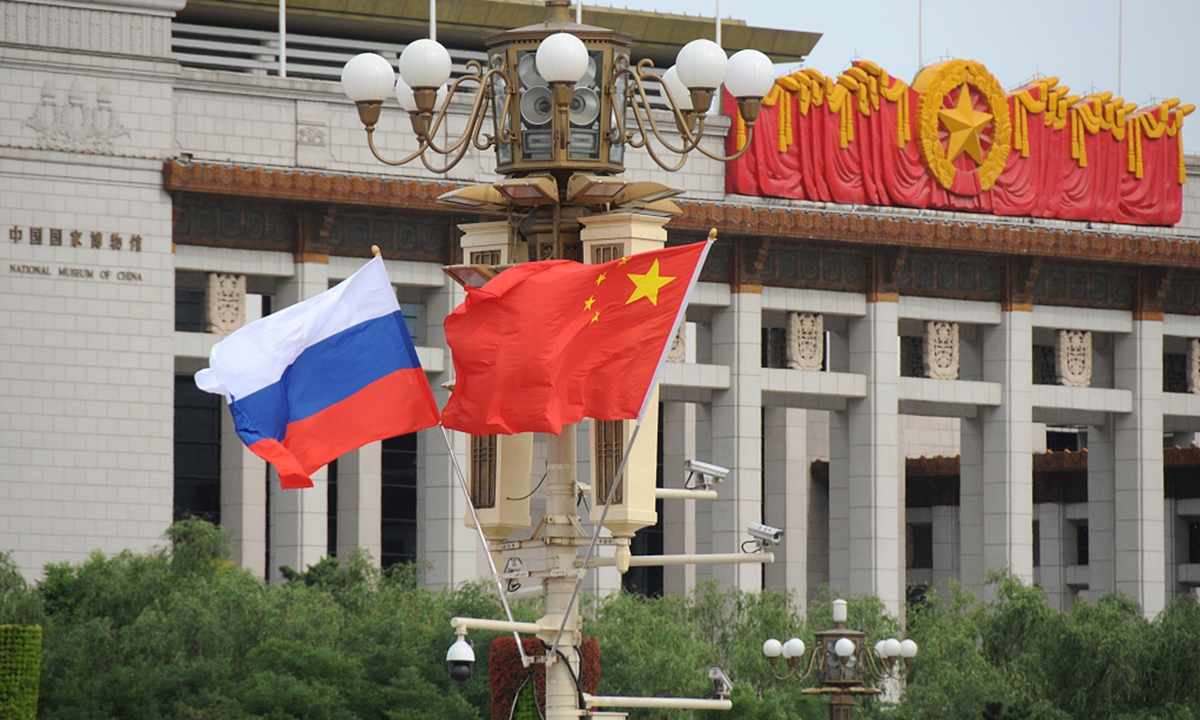
China Russia Photo:VCG
China’s trade with Russia jumped significantly in the first ten months of 2023, according to official data released on Tuesday, underscoring deepening bilateral cooperation between the two countries.
From January to October, China’s trade with Russia jumped by 27.7 percent to $196.48 billion, with China’s exports to Russia soaring 52.2 percent year-on-year to $90.08 billion and imports from Russia increasing 12.4 percent to $106.41 billion, according to data from China’s General Administration of Customs (GAC).
The growth rate in China’s trade with Russia was strikingly faster than for China’s trade with many other major trading partners, including the EU and the US. In the first ten months, in US dollar terms, China’s trade with the EU dropped by 7.5 percent year-on-year, while trade with the US fell by 13.2 percent, the GAC data showed.
Experts said that trade between China and Russia is on track to surpass $200 billion this year, reaching the target set by the two countries in 2019 one year ahead of schedule.
The strong growth in bilateral trade comes as China and Russia have been deepening win-win economic and trade cooperation through various efforts. During a visit to China in May, Russian Prime Minister Mikhail Mishustin said that bilateral trade between China and Russia could hit the $200 billion mark this year.
In 2022, China was Russia’s biggest trading partner for the 13th straight year, with bilateral trade hitting a new high of 1.276 trillion yuan ($190.27 billion).
Zhang Hong, an associate research fellow at the Institute of Russian, Eastern European and Central Asian Studies of the Chinese Academy of Social Sciences, said there is no doubt that the trade volume between China and Russia will exceed $200 billion this year.
“This is a milestone figure for the economic and trade cooperation between the two countries. From now on, China-Russia trade will enter a new stage,” Zhang told the Global Times on Tuesday.
Zhang said that in recent years, Russia’s energy exports have increasingly shifted to the Asia Pacific and its strategy of looking to the East has also helped to boost China-Russia trade.
“With the high degree of political mutual trust between China and Russia, a series of bilateral trade facilitation measures have also promoted the growth of trade between the two countries,” he said, adding that the use of local currencies in settling trade has also helped.
The two countries have been increasing the use of their own currencies in trade settlement, in an attempt to cut reliance on the US dollar, which has increasingly been weaponized by the US government in geopolitical gambits against other countries.
In July, the share of Chinese yuan in Russia's foreign exchange transactions hit a new high of 44 percent. In an interview with the Global Times last week, Oleg Deripaska, industrialist, philanthropist and founder of aluminum giant Rusal, said that China and Russia can further explore integration in financial infrastructure, and China-Russia local currency settlement cooperation can go further.
The two countries have also moved steadily in expanding cooperation in areas such as energy and food. In the latest development on Thursday, Sputnik News reported that Russian energy firm Gazprom signed an agreement on Wednesday with China National Petroleum Corp (CNPC) and PipeChina on the design and construction of a pipeline section in the Far East, which will be used to deliver Russian gas to China.
Some Western politicians have been criticizing and even seeking to interfere in China-Russia economic and trade cooperation, but Chinese and Russian officials have dismissed such criticism and interference and vowed to continue normal win-win cooperation.
The US recently announced sanctions on a new batch of Chinese companies for providing dual-use products to Russia, which drew a harsh response from the Chinese Foreign Ministry.
“Over a very short period of time, the US imposed more unilateral sanctions on Chinese companies citing their relations with the Russian side. This is a typical move of economic coercion, unilateralism and bullying,” Wang Wenbin, a spokesperson for the Chinese Foreign Ministry, told a regular press briefing on Friday.
Wang said that the US needs to correct its wrongdoing immediately, and stop suppressing Chinese companies. China will continue to do what is necessary to firmly safeguard the lawful rights and interests of Chinese companies.
